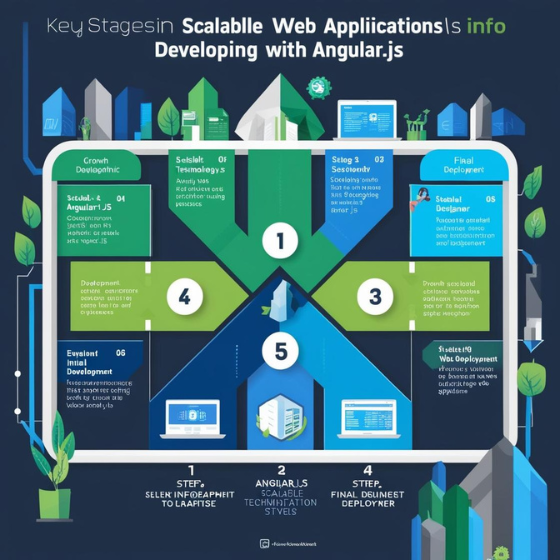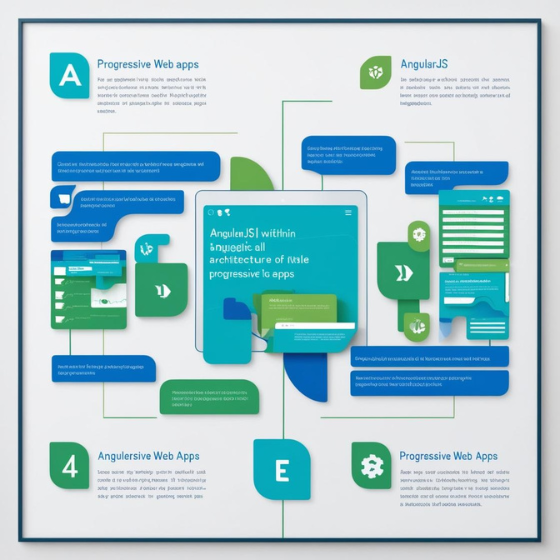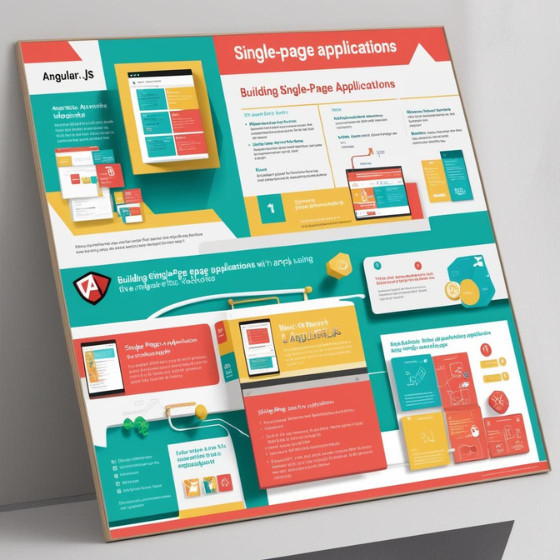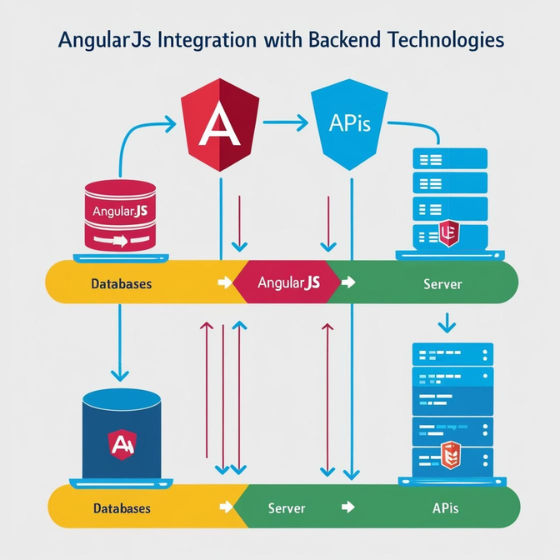How to Develop Scalable Web Applications with Angular.js
In the dynamic world of web development, scalability is no longer a luxury but a necessity. With businesses evolving rapidly, a scalable web application ensures seamless performance, even as user demands grow. Angular.js, a robust JavaScript framework by Google, is a popular choice for developing scalable, efficient, and user-friendly web applications.
If you’ve ever wondered how to develop scalable web applications with Angular.js, you’re in the right place. This blog delves into the step-by-step process, the advantages of Angular.js, and actionable strategies to build applications that grow with your business.
Why Angular.js is Ideal for Scalable Web Applications
1. Modular Architecture
Angular.js organizes code into modules, making it easier to manage and scale as the application grows. This structure ensures that developers can add new features without disrupting existing ones.
2. Two-Way Data Binding
The framework’s two-way data binding feature allows real-time synchronization between the model and view. This ensures smooth performance, even as the application scales to accommodate more users.
3. Dependency Injection
Angular.js’s built-in dependency injection system simplifies managing and scaling complex applications by ensuring each component is self-contained and reusable.
4. Large Ecosystem and Community Support
With a thriving developer community and a wide range of plugins, Angular.js provides tools and resources that simplify the process of scaling applications.
By leveraging these features, businesses can ensure their web applications are both robust and future-ready. Want to learn more about Angular.js? Check out Sodio’s web development services.
Steps to Develop Scalable Web Applications with Angular.js
1. Define Your Application Architecture
Start by planning your application architecture. This involves:
- Identifying core modules for user management, data processing, and analytics.
- Creating a clear roadmap for future features and scalability needs.
Pro Tip: Use Angular.js’s modular approach to organize your application into smaller, manageable parts.
2. Optimize Code Structure and Components
Scalability starts with clean, efficient code. Follow these best practices:
- Use reusable components to simplify updates and scaling.
- Stick to Angular.js’s MVC (Model-View-Controller) pattern to maintain a clean codebase.
- Avoid hardcoding and rely on services for dynamic data handling.
3. Leverage Angular.js’s Tools and Libraries
Angular.js offers various built-in tools and third-party libraries to enhance scalability:
- Use Angular CLI for efficient code generation and project management.
- Incorporate libraries like RxJS for handling asynchronous tasks.
Example: A leading e-commerce company scaled its web platform using Angular CLI to manage code efficiently across multiple development teams.
4. Optimize for Performance
Scalable applications must maintain performance under heavy loads. Optimize your Angular.js application by:
- Lazy Loading: Load only the necessary components to reduce initial load time.
- AOT Compilation: Use Ahead-of-Time (AOT) compilation to speed up rendering.
- Caching Strategies: Implement caching mechanisms to minimize server requests.
Explore Sodio’s performance optimization services to learn how we enhance application efficiency.
5. Test and Iterate
Testing is crucial for scalability. Regularly test your application for:
- Performance under load to identify bottlenecks.
- Security vulnerabilities to protect sensitive user data.
- User experience to ensure the application meets customer expectations.
Use Angular.js’s built-in testing tools like Karma and Protractor to automate and streamline the process.
Case Studies: Success Stories with Angular.js
1. FinTech Platform
A FinTech startup used Angular.js to build a scalable platform for managing transactions and user portfolios. By leveraging Angular’s modular architecture and real-time data binding, the platform seamlessly handled a 300% increase in user activity during its first year.
2. Healthcare Application
A healthcare provider created a telemedicine app using Angular.js. With features like lazy loading and reusable components, the app scaled to support a nationwide rollout, providing uninterrupted service to thousands of users daily.
Common Challenges in Scaling with Angular.js and How to Overcome Them
Challenge 1: Managing Large Codebases
Solution: Use Angular.js’s hierarchical dependency injection system to organize code effectively.
Challenge 2: Performance Optimization
Solution: Implement best practices like AOT compilation and lazy loading to enhance performance.
Challenge 3: Real-Time Data Synchronization
Solution: Leverage Angular.js’s two-way data binding to ensure smooth, real-time updates without compromising performance.
For expert guidance, consult Sodio’s frontend development team.
Benefits of Choosing Angular.js for Scalable Web Applications
1. Enhanced User Experience
Angular.js ensures dynamic and interactive user interfaces, improving engagement and satisfaction.
2. Cost Efficiency
Its modular nature reduces development time and costs by allowing teams to reuse components across projects.
3. Future-Ready Applications
With Google’s backing, Angular.js continues to evolve, ensuring compatibility with the latest web technologies.
Did You Know? Businesses using Angular.js report a significant reduction in development timelines, leading to faster time-to-market.
How Sodio Can Help You Scale with Angular.js
At Sodio, we specialize in building scalable web applications tailored to your business needs. Here’s how we can assist:
- Custom Angular.js Solutions: Designed to meet your unique scalability requirements.
- End-to-End Development: From ideation to deployment, we handle it all.
- Ongoing Support: Ensure your application grows seamlessly with your business.
Looking to scale your web application? Contact us today for a free consultation!
Actionable Tips for Businesses
If you’re considering Angular.js for your web application, here’s how to get started:
- Invest in Training: Ensure your development team is well-versed in Angular.js.
- Start with a MVP: Develop a Minimum Viable Product (MVP) to test scalability.
- Choose the Right Partner: Collaborate with experienced developers or agencies like Sodio.
Conclusion: Building Scalable Applications with Angular.js
Understanding how to develop scalable web applications with Angular.js is crucial for businesses aiming to thrive in today’s digital landscape. Angular.js’s robust features, modular architecture, and strong community support make it a reliable choice for building applications that grow with your business.
Ready to take your web application to the next level? Explore Sodio’s comprehensive Angular.js development services or schedule a consultation with our experts to get started.







